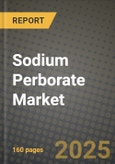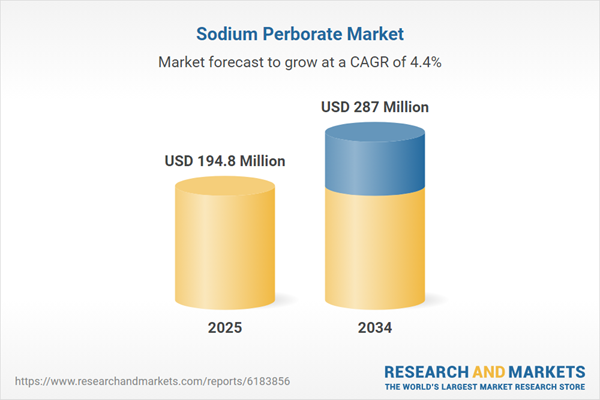Sodium Perborate Market
Sodium perborate is an oxygen-releasing inorganic peroxide widely used as a bleaching and hygiene agent, valued for its stability in dry blends and predictable active oxygen delivery. It is produced by reacting borate salts with hydrogen peroxide and crystallizing into mono- and tetrahydrate grades; the choice dictates solubility, storage behavior, and performance in cool or warm wash conditions. The core application remains powder laundry detergents and tablets, followed by automatic dishwash formulations, stain removers, and specialized hygiene products such as denture cleansers and hard-surface cleaners. Formulators pair sodium perborate with activators (e.g., TAED and newer low-temperature boosters), catalysts, enzymes, and anti-redeposition systems to achieve stain removal at reduced wash temperatures. Key trends include compacted powders, controlled-dust granulation, coated or encapsulated perborate for moisture protection, and blends engineered for rapid dissolution in short wash cycles. Drivers stem from consumer demand for hygienic, brightening performance, the resilience of powder formats in many geographies, and supply-chain reliability for dry oxygen systems where liquid logistics are constrained. The competitive landscape features integrated peroxide producers, boron-value-chain players, and regional blenders; competition from sodium percarbonate and peracid systems is pronounced, particularly in liquid detergents and markets prioritizing “boron-free” claims. Regulatory scrutiny around boron compounds and evolving eco-label criteria influence product positioning, labeling, and allowable end-uses, prompting investments in risk assessment, exposure control, and customer guidance. Overall, sodium perborate remains strategically relevant where powder detergents dominate, low-temperature bleaching is required, and dry stability outweighs the handling benefits of liquid oxidizers.Sodium Perborate Market Key Insights
- Form factor and grade selection determine performance. Tetrahydrate offers handling stability for mainstream powders, while monohydrate enables higher active oxygen per unit mass and improved low-temperature release. Coating technologies reduce caking and humidity uptake. Granule engineering targets fast dispersion without undissolved residues. These levers allow formulators to balance performance, storage, and shelf-life objectives.
- Activation systems are central to cold-wash efficacy. Pairing sodium perborate with activators such as TAED or emerging catalysts lowers the effective bleaching temperature. Synergies with enzymes enable stain removal at shorter cycles. Modern builders manage alkalinity and water hardness to protect fabric integrity. This multi-additive architecture keeps perborate competitive against alternative oxidants in energy-saving wash programs.
- Powder detergent resilience underpins baseline demand. In regions where powders lead household care, perborate remains a workhorse due to dry stability, cost-in-use predictability, and robust supply chains. Tabletized and compacted formats further entrench usage. Performance on oxidizable stains, odor control, and hygiene claims sustains brand differentiation, particularly in value and mid-premium tiers.
- Liquid systems favor alternatives - pushing innovation in powders. Compatibility challenges in aqueous matrices and storage stability constraints limit perborate use in liquids, steering share toward percarbonate and liquid peroxide adducts. In response, suppliers emphasize advanced granulation, dust control, and dissolution kinetics in powders. This channel specialization shapes capex and product roadmaps.
- Regulatory and eco-label dynamics shape market access. Classification and labeling of boron compounds require careful stewardship, safety data transparency, and customer training. Regional eco-label criteria influence use concentrations, consumer communication, and claims language. Suppliers increasingly provide exposure modeling and lifecycle dossiers to support compliance and retailer acceptance.
- Supply chain is anchored in boron and hydrogen peroxide availability. Feedstock security, energy intensity of peroxide production, and logistics for dry bulk handling drive cost structures. Producers diversify sourcing, optimize crystallization efficiency, and invest in packaging that mitigates moisture ingress. Strategic stock positions support peak detergent seasons and weather-related disruptions.
- Performance proof points go beyond whiteness. Brands now measure malodor reduction, microbial hygiene benefits, and color-safe bleaching to tell a broader efficacy story. Controlled release minimizes fabric damage and dye attack. Consumer-perceptible outcomes - brightness retention, odor control, and machine cleanliness - reinforce repeat purchase.
- Sustainability is operationalized, not just promised. Priorities include energy-efficient production, waste minimization in crystallization, and recyclable packaging for high-alkaline powders. Route efficiency and warehouse climate control reduce spoilage. Clear stewardship guidance on dosing, storage, and child safety aligns with retailer and regulator expectations.
- Industrial and specialty niches add resilience. Beyond household care, perborate features in textile processing aids, certain paper and surface hygiene applications, and dental cleansing products where dry stability is prized. These niches demand strict impurity control, predictable oxygen release, and documentation for audits, supporting premium positioning.
- Risk management is a maturity marker. Best-in-class players maintain rigorous HACCP-like quality systems, moisture and temperature monitoring across the chain, and mock recall capabilities. Customer technical service - covering build-out of activator systems, enzyme compatibility, and effluent considerations - reduces reformulation risk and speeds commercialization.
Sodium Perborate Market Reginal Analysis
North America
Powder detergents retain a meaningful footprint in club, mass, and value channels, sustaining perborate-based bleaching systems. Brands emphasize low-temperature performance, shorter cycles, and machine hygiene outcomes alongside fabric care. Retailer requirements for safety communication and child-resistant packaging shape format choices. Competition from percarbonate in liquids intensifies, but compacted powders and tablets remain viable for households seeking cost-effective hygiene.Europe
Eco-label frameworks, classification norms for boron compounds, and retailer policies drive meticulous compliance and labeling discipline. Northern and Western markets prioritize cold-wash efficacy and sustainability claims, prompting optimization of activator ratios and dissolution profiles. Private-label and multinational brands invest in dust-controlled granules and recyclable packaging. Regulatory expectations influence use levels, while specialty uses persist under strict stewardship.Asia-Pacific
APAC is heterogeneous: mature markets balance premium compact powders with convenience liquids, while emerging economies maintain strong powder preferences. Perborate adoption aligns with robust distribution of powder formats, price sensitivity, and infrastructure for dry bulk logistics. Local sourcing of borates and peroxide capacity expansion support regional supply security. Education around low-temperature bleaching and short-cycle performance drives premium trade-ups.Middle East & Africa
Powder detergents dominate household laundry in many MEA markets, favoring dry oxidizers with long shelf-life and heat-resilient packaging. Supply reliability and warehouse climate control are central to quality retention. Value-tier brands leverage perborate for visible whitening and hygiene claims, while regulatory stewardship and clear dosing guidance build retailer confidence. Regional blending and tolling partnerships improve availability.South & Central America
Perborate benefits from the strong cultural fit of powder formats in several countries, with compacted and fragrance-forward SKUs common in mainstream retail. Distributors prioritize stable, dust-controlled granules that withstand humidity and transport. Technical support for activator systems and enzyme compatibility enables cold-wash efficacy narratives. Localization of labeling and safe-use communication supports retailer acceptance and consumer trust.Sodium Perborate Market Segmentation
By Type
- Sodium Perborate Monohydrate
- Sodium Perborate Tetrahydrate
By End-User
- Household & Industrial Cleaning
- Personal Care & Cosmetics
- Textile Industry
- Pulp & Paper Industry
- Healthcare & Pharmaceuticals
- Others
Key Market players
Thermo Fisher Scientific Inc., Merck KGaA, Evonik Treibacher GmbH, Belinka Perkemija d.o.o., Fengchen Group Co., Ltd., Acuro Organics Limited, Kishida Chemical Co., Ltd., Catalynt Inc., Junsei Chemical Co., Ltd., Noah Chemicals, Wanli Chemical, Central Drug House, Meru Chem Pvt. Ltd., Pat Impex India, Kylin Chemicals Co., Ltd.Sodium Perborate Market Analytics
The report employs rigorous tools, including Porter’s Five Forces, value chain mapping, and scenario-based modelling, to assess supply-demand dynamics. Cross-sector influences from parent, derived, and substitute markets are evaluated to identify risks and opportunities. Trade and pricing analytics provide an up-to-date view of international flows, including leading exporters, importers, and regional price trends.Macroeconomic indicators, policy frameworks such as carbon pricing and energy security strategies, and evolving consumer behaviour are considered in forecasting scenarios. Recent deal flows, partnerships, and technology innovations are incorporated to assess their impact on future market performance.
Sodium Perborate Market Competitive Intelligence
The competitive landscape is mapped through proprietary frameworks, profiling leading companies with details on business models, product portfolios, financial performance, and strategic initiatives. Key developments such as mergers & acquisitions, technology collaborations, investment inflows, and regional expansions are analyzed for their competitive impact. The report also identifies emerging players and innovative startups contributing to market disruption.Regional insights highlight the most promising investment destinations, regulatory landscapes, and evolving partnerships across energy and industrial corridors.
Countries Covered
- North America - Sodium Perborate market data and outlook to 2034
- United States
- Canada
- Mexico
- Europe - Sodium Perborate market data and outlook to 2034
- Germany
- United Kingdom
- France
- Italy
- Spain
- BeNeLux
- Russia
- Sweden
- Asia-Pacific - Sodium Perborate market data and outlook to 2034
- China
- Japan
- India
- South Korea
- Australia
- Indonesia
- Malaysia
- Vietnam
- Middle East and Africa - Sodium Perborate market data and outlook to 2034
- Saudi Arabia
- South Africa
- Iran
- UAE
- Egypt
- South and Central America - Sodium Perborate market data and outlook to 2034
- Brazil
- Argentina
- Chile
- Peru
Research Methodology
This study combines primary inputs from industry experts across the Sodium Perborate value chain with secondary data from associations, government publications, trade databases, and company disclosures. Proprietary modeling techniques, including data triangulation, statistical correlation, and scenario planning, are applied to deliver reliable market sizing and forecasting.Key Questions Addressed
- What is the current and forecast market size of the Sodium Perborate industry at global, regional, and country levels?
- Which types, applications, and technologies present the highest growth potential?
- How are supply chains adapting to geopolitical and economic shocks?
- What role do policy frameworks, trade flows, and sustainability targets play in shaping demand?
- Who are the leading players, and how are their strategies evolving in the face of global uncertainty?
- Which regional “hotspots” and customer segments will outpace the market, and what go-to-market and partnership models best support entry and expansion?
- Where are the most investable opportunities - across technology roadmaps, sustainability-linked innovation, and M&A - and what is the best segment to invest over the next 3-5 years?
Your Key Takeaways from the Sodium Perborate Market Report
- Global Sodium Perborate market size and growth projections (CAGR), 2024-2034
- Impact of Russia-Ukraine, Israel-Palestine, and Hamas conflicts on Sodium Perborate trade, costs, and supply chains
- Sodium Perborate market size, share, and outlook across 5 regions and 27 countries, 2023-2034
- Sodium Perborate market size, CAGR, and market share of key products, applications, and end-user verticals, 2023-2034
- Short- and long-term Sodium Perborate market trends, drivers, restraints, and opportunities
- Porter’s Five Forces analysis, technological developments, and Sodium Perborate supply chain analysis
- Sodium Perborate trade analysis, Sodium Perborate market price analysis, and Sodium Perborate supply/demand dynamics
- Profiles of 5 leading companies - overview, key strategies, financials, and products
- Latest Sodium Perborate market news and developments
Additional Support
With the purchase of this report, you will receive:- An updated PDF report and an MS Excel data workbook containing all market tables and figures for easy analysis.
- 7-day post-sale analyst support for clarifications and in-scope supplementary data, ensuring the deliverable aligns precisely with your requirements.
- Complimentary report update to incorporate the latest available data and the impact of recent market developments.
This product will be delivered within 1-3 business days.
Table of Contents
Companies Mentioned
- Thermo Fisher Scientific Inc.
- Merck KGaA
- Evonik Treibacher GmbH
- Belinka Perkemija d.o.o.
- Fengchen Group Co. Ltd.
- Acuro Organics Limited
- Kishida Chemical Co. Ltd.
- Catalynt Inc.
- Junsei Chemical Co. Ltd.
- Noah Chemicals
- Wanli Chemical
- Central Drug House
- Meru Chem Pvt. Ltd.
- Pat Impex India
- Kylin Chemicals Co. Ltd.
Table Information
| Report Attribute | Details |
|---|---|
| No. of Pages | 160 |
| Published | November 2025 |
| Forecast Period | 2025 - 2034 |
| Estimated Market Value ( USD | $ 194.8 Million |
| Forecasted Market Value ( USD | $ 287 Million |
| Compound Annual Growth Rate | 4.4% |
| Regions Covered | Global |
| No. of Companies Mentioned | 15 |









